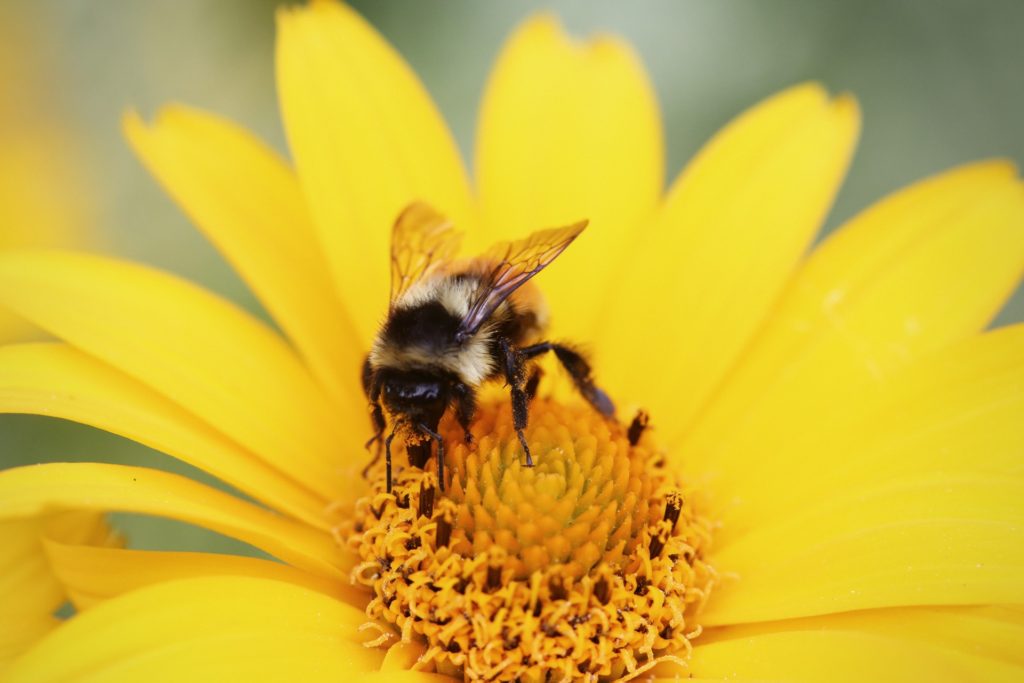Bee populations have been decreasing steadily across the globe over recent years, and with a ginormous 44% loss between 2015 and 2016 in the U.S. alone, it seems that now is a more crucial time than ever to find effective methods to protect them.
The National Resources Defense Council (NRDC) states that “Researchers are calling the mass disappearance ‘Colony Collapse Disorder'” and that “The number of hives in the United States is now at its lowest point in the past 50 years”.

Why Are Bee Populations Declining?
Whilst researchers are still theorizing the main cause of colony collapses, it is widely recognized that environmental damage is having a hugely negative impact on their (very delicate) ecosystem.
‘Environmental damage’ is a pretty broad term though, so let’s hone in on some specifics.
Pesticides
Commonly used in crop cultivation and throughout the agriculture industry in general, chemical sprays and pesticides have been found to be partially responsible for the death and impairment of bees (and other wildlife). Measuring the direct correlation between pollinator health and pesticide use is complex however there is substantial evidence on toxicity in bee colonies subsequent to chemical exposure.
Intensive Farming Practices
Relying heavily on perennial habitats such as forests, hedgerows, lush grasslands and fields; bees, it seems, are struggling to find spaces to call home. Due to the intensification of modern day agricultural practices, valuable land and wildlife habitats are becoming less and less available. At the same time however, according to a 2013 report from Greenpeace “agriculture systems that work with biodiversity and without chemicals, such as ecological farming systems, can benefit pollinator communities, both managed and wild”
Parasites, Disease and Viruses
The introduction of viruses and parasites such as Varroa destructor and Nosema ceranae have been found to be serious threats to honeybee colonies. Commercial bees are often transported to unnatural locations which means they are at risk to exposure of new viruses and pathogens which then causes disease among bees and eventually collapsed colonies.

Why Are Bees So Important?
Like all species, the humble bumble bee plays a pivotal role in the health of our environment and the ecosystems within it. Bees in particular are largely responsible for regulating our food supply by way of pollinating of our crops. In fact, just 2% of bees have been found to be responsible for pollinating 80% of our crops (globally!).
Bees may be small but they are extremely hard working creatures and if that tiny two percent is lost, 80% of our food from crop cultivation will also disappear. We’re talking apples, oranges, avocados, blueberries, broccoli, onions, almonds and so much more. Considering that the world is already suffering from a severe food scarcity – is this what we want to be heading towards?
Additionally, bees are extremely important factors when it comes to feeding other living organisms (plants and animals alike). They are largely an integral part to many ecosystems and losing them means losing birds, mice, squirrels, flowers and weeds the same.

How Can We Help?
1. Plant a Bee-Garden
There are many practical things you can do to your garden to make it more bee-friendly. Start by choosing native-plants or buying flowers which bloom year round.
2. Choose organic or grow your own
Avoiding pesticides and GMOs may be one of the best things you can do to support bees and encourage colony survival. Buying organic food and plant material is an easy (but sometimes costly) way to do this; however if you have the ability to grow your own, you could end up better-off!
3. Build a Bee-Hotel
Bees are solitary things and need protected individual areas to nest and look after their larvae. Building a bee hotel/house is simple to do and provides an extra space for them when naturally occurring homes are less available.
So remember, in the words of Barry B Benson or maybe Donald Trump: “we are one colony — and their pain is our pain. Their dreams are our dreams; and their success will be our success. We share one heart, one hive and one glorious destiny”


